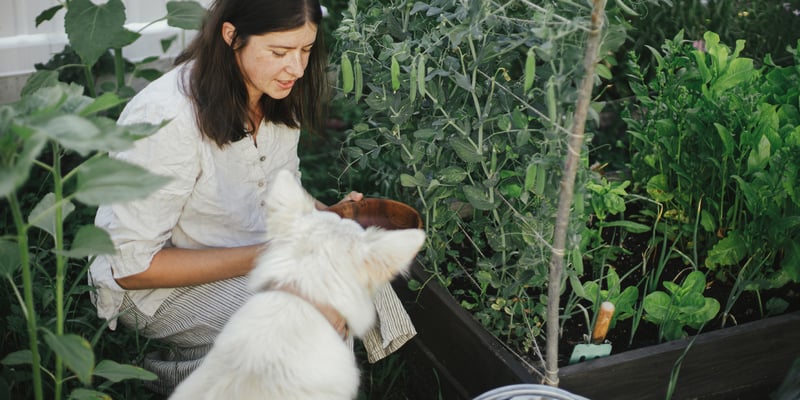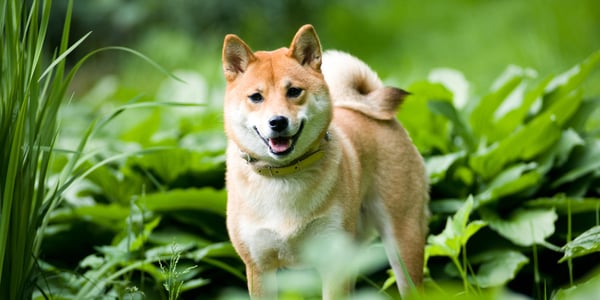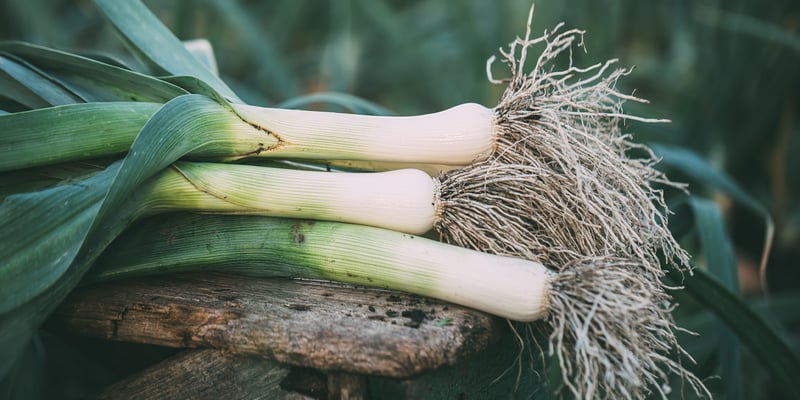Can Dogs Eat Leeks? Understanding the Risks of Leek Poisoning in Dogs
Index:



Introduction
Our furry friends show us love every day so it’s up to us to care for them tenderly in return.
But, sharing our lives means understanding the good and bad in dog diets.
Questions abound, we'd like to continue our helpful guides to human foods and our pets, answering the question, can dogs eat leeks? Or are we putting them at risk?
We know that not all human food is safe for dogs. We also know that leeks add flavour to our food but unfortunately, they are extremely harmful to dogs, being part of the allium family.
This makes the idea of leek poisoning a scary reality for pet owners.
So let's learn why leeks are a danger to our dogs and the health issues they could cause.
Key takeaways
Leeks are part of the allium family and are highly poisonous to dogs, leading to potentially fatal leek poisoning.
Ingesting leeks can cause significant health issues in dogs, such as vomiting, diarrhoea, and severe red blood cell damage.
While leeks offer health benefits to humans, it's imperative to remember that they're not healthy dog food options.
Understanding that leeks, and similar alliums like onions and garlic, are toxic to dogs is key to preventing accidental poisoning.
Dog owners must take proactive measures to ensure leeks and other dangerous foods are kept securely away from their pets.
The toxicity of the allium family
Alliums like onions and garlic add great taste to our meals. But, they contain compounds that are very harmful to dogs.
These compounds cause oxidative damage to red blood cells, leading to hemolytic anaemia.
This condition impairs oxygen transport in the body and could lead to serious health issues if untreated.
Differential susceptibility among dog breeds
Different dog breeds have varying sensitivities to allium poisoning. For example, Japanese breeds such as the Akita and Shiba Inu are more vulnerable.
Even tiny amounts of leeks can cause significant problems for these dogs.
Owners of these breeds should be especially careful to keep leeks away from their pets.



Can dogs eat any leek at all?
Even small bits of leeks can be harmful. So, it's wise to not feed your pets these foods at all.
Always keep your pet on a safe diet and away from these harmful foods. Remember that what's healthy for people can be dangerous for your pets. When it involves leeks, onions, and garlic, it's best to keep them away from your pet's food.
Leeks are toxic to both dogs and cats.
Small amounts of leeks can cause anaemia in dogs.
Cooking does not remove the toxic effects of leeks.
It's best to not feed dogs anything from the allium family.
It's crucial for pet owners to protect their dogs from dangerous foods. Look for safe foods for dogs that meet their nutritional needs without posing risks.
Explore the peace of mind that comes with knowing your pet's health is protected with Waggel.
Waggel covers vet bills for accidents, injuries, and illnesses, up to your chosen Annual Limit, ensuring your beloved companion can always receive the best care without the worry of cost.
To learn more about how we can help keep your furry friend healthy and safe, visit the Waggel homepage.
Debunking the myth: raw vs cooked leeks
There's also confusion about if cooking makes alliums less toxic. Some people argue that cooking can make leeks or garlic safer for dogs.
However, this isn't true. Both raw and cooked, these foods are still toxic to dogs and harmful to their health.
What are the symptoms of leek poisoning in dogs?
Being proactive and informed about the symptoms to watch for is paramount to ensuring the well-being of your canine companion.
Without knowing if your dog has had access to or eaten leeks recently, you may confuse the symptoms with a range of other issues. However, the general signs are below.
Behavioural changes and physical signs
The marked symptoms of anaemia—such as breathlessness and lethargy, should prompt immediate concern.
An affected dog may exhibit vomiting and diarrhoea, combined with abdominal pain that might emerge through visible distress or excessive drool.
A notable decrease in appetite is another red flag. Should these symptoms be observed, assessing your dog’s gum colour is critical; pale gums can indicate a low red blood cell count, a tell-tale sign of possible leek ingestion.
When to seek immediate veterinary care
Should your dog display any of these worrying symptoms, especially after a known or suspected incident of consuming leeks, call your veterinarian without delay.
The health risks associated with leek poisoning, like a significant drop in red blood cell count, necessitate urgent medical intervention.
Contact your vet as soon as you recognise a potential problem; their expert guidance could be the difference between a quick recovery and a dire outcome.
Early detection and prompt veterinary attention are the best defence against the dangers of leek toxicity in dogs.



Preventative measures to protect your dog
Taking proactive measures can significantly lower poison risks. This means you may need to adjust your garden and check your pantry items carefully.
Regular checks in areas where pets eat and play are crucial. To prevent accidents, ensure everything they have access to is safe.
Don't plant or keep allium species where your dog can get to them. Even a little bit can be harmful if eaten.
Keep a list of safe foods for dogs on your fridge or phone. It'll make meal times safer and easier.
Make both inside and outside areas safe for your pet. This reduces the chance of them eating something harmful.
Have pet poison helpline numbers like the Animal Poison Helpline visible or in your phone. It's important for quick access during emergencies.
Prevention is the best approach to protect our dogs from food dangers. Start by being cautious at home.
We also recommend extending that care to all the places your dogs go and advise owners to stay updated on what's safe for their pets to eat.
Creating a balanced and toxic-free diet
Creating a safe and nutritious diet requires careful planning. It's important to know which foods are toxic for dogs and which are beneficial.
Avoid onions and leeks and choose a variety of healthy foods safe for dogs instead.
Even though dogs can't eat onions or leeks, there are plenty of safe vegetables for them.
The Waggel blog contains a wide selection of information on veggies and their safety for pets.
For example, while some may consider turnips as an uncommon choice, they can be a healthy part of your dog's diet when given in moderation.
Similarly, celery is not only safe but also provides vitamins and fibre, which are beneficial for your dog's health.
And for a refreshing treat, especially during warmer days, cucumbers can provide hydration and are low in calories.
Additionally, dogs can enjoy a variety of fruits like mangoes and strawberries, which are tasty and safe when given in proper amounts.
For a guide to a popular takeaway snacks, see our post "can dogs eat prawn crackers?" here.
Conclusion
Leeks add unique flavour to our food but are very dangerous for dogs, causing leek poisoning.
They are a part of the allium family and can severely upset a dog's stomach and can cause damage to their blood cells.
If your dog shows signs of poisoning like weakness, vomiting, or diarrhoea, act fast. Getting a vet's help quickly is key.
It's important to always ensure your furry friends' diet is right for their individual requirements in order to keep them happy and healthy.
FAQs
Can dogs eat leeks?
No, dogs should not eat leeks. They are part of the allium family, which is toxic to dogs and cats. This can lead to leek poisoning, harming their health.
What makes leeks toxic to dogs?
Leeks contain harmful compounds like disulphides and thiosulfinates. These damage red blood cells, causing anaemia and other health issues in dogs.
Are some dogs more susceptible to allium poisoning than others?
Yes, Japanese breeds like Akita and Shiba Inu are more sensitive. But, all dogs can be harmed, so keep them away from leeks and similar plants.
Is it safe for a dog to consume small amounts of leeks?
No, even tiny amounts of leeks are dangerous for dogs. Any amount can cause poisoning, damaging their red blood cells.
Can cooking leeks make them safe for dogs?
Cooking does not make leeks safer for dogs. Both raw and cooked leeks pose a risk and should not be given to dogs.
What are the symptoms of leek poisoning to look out for?
Watch for vomiting, diarrhoea, less appetite, tiredness, pale gums, and lots of drooling. These show abdominal pain and may take hours to days to appear.
What should I do if my dog shows signs of leek poisoning?
If your dog starts vomiting or shows other poisoning signs, or if they've eaten leeks, call your vet right away. Fast action is key.
How can I prevent my dog from being poisoned by leeks?
Keep your dog away from leeks, onions, garlic, and other similar plants. Make sure their food does not contain any of these.
What's the treatment if a dog has eaten leeks
Your vet might need to make your dog vomit, give activated charcoal to soak up toxins, and use IV fluids for hydration. Serious cases sometimes need blood transfusions and more intense care.
Waggel Pet Insurance
Need more help? You're in luck if you're a Waggel Pet Insurance member. Along with our excellent coverage, we offer access to a 24/7 online vet to answer all your sticky questions, especially if you need grooming assistance.
Not a member? Why not get a quote now and cover your furry friend for a range of illnesses, all while enjoying our amazing perks and rewards.
Want more like this?
Get updates from us with helpful info, advice, answers to frequently asked questions and much more.
Index:
Related posts:
Get your quote
Along with our excellent coverage, we offer access to a 24/7 online vet to answer all your sticky questions.





